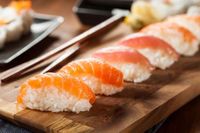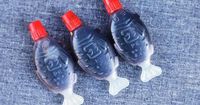On September 1, 2025, South Australia made headlines by enacting a ban on one of the most recognizable—and perhaps surprising—symbols of the global sushi boom: the tiny, fish-shaped plastic soy sauce bottles. For many sushi lovers, these whimsical containers have been a staple of takeaway meals for decades. But for South Australian officials and environmental advocates, they had become a potent symbol of the world’s mounting plastic waste crisis.
South Australia, home to 1.9 million people, became the first state in Australia to specifically prohibit restaurants from offering these decorative condiment bottles to customers. The new law also covers similar rectangular containers with lids, caps, or stoppers that hold less than 30 milliliters (about 1 ounce) of soy sauce. The ban is part of a sweeping initiative to curb plastic pollution and encourage more sustainable practices across the food service industry.
Why single out the fish-shaped bottles? According to BBC and statements from South Australia’s Deputy Premier Susan Close, these tiny containers are especially problematic. "They are easily dropped, blown away, or washed into drains," Close explained. Even when conscientious diners toss them into recycling bins, their diminutive size means they can slip through sorting machinery, ending up in landfills or as fugitive plastics in the environment. Once in the wild, they can be mistaken for food by marine life, with potentially devastating consequences for ocean ecosystems.
"Even when the bottles landed in recycling bins, they were too small to be captured by sorting machinery and often end up in landfill or as fugitive plastic in the environment," Close said, underscoring the challenge these items pose for waste management systems. The new regulations require restaurants to switch to larger bottles, refillable condiment containers, or what officials describe as less harmful single-use alternatives, such as sachets, squeezable packs, or compostable vessels.
The ban on fish-shaped bottles is just the latest chapter in South Australia’s ongoing battle against single-use plastics. The state has built a reputation as a leader in eco-friendly legislation, beginning in 2009 when it became the first state in Australia to ban single-use plastic shopping bags. Since then, the list of prohibited plastics has grown steadily. In 2021, the state outlawed plastic cutlery, straws, many forms of takeout packaging, and single-use coffee cups. As of September 2025, the ban now extends to plastic cutlery or straws attached to food items (like the straws often connected to juice boxes), as well as balloon sticks, confetti, and Q-Tips.
Enforcement of these bans falls to the South Australian Environment Protection Authority. The agency has the power to issue anything from warnings to formal prosecutions for breaches, reflecting the state’s serious commitment to reducing plastic waste. Restaurants and businesses are expected to adapt quickly, and compliance is being closely monitored.
But not all planned bans have rolled out smoothly. The next item on the state’s prohibition list—plastic stickers on fresh produce, such as apples—has been delayed. Originally scheduled for 2025, the ban was postponed following concerns from producers about increased costs and potential disruptions to the supply chain that moves fresh fruit and vegetables between Australian states. This delay highlights the practical challenges of eliminating plastics from every corner of the consumer economy, even when the environmental rationale is clear.
South Australia’s initiative is part of a broader global movement to tackle plastic pollution, a problem that has reached staggering proportions. According to the United Nations Environment Programme, the world now produces so much plastic waste that the equivalent of 2,000 garbage trucks full of plastic are dumped into oceans, rivers, and lakes every single day. Most of this waste is single-use: bottles, containers, packaging—items designed to be used once and discarded. The UN estimates that about 85% of these single-use plastics end up in landfills or are mismanaged, meaning they are either littered or otherwise escape proper disposal.
Other countries and cities are taking action as well. In 2023, New Zealand implemented a nationwide ban on thin plastic bags used for produce in grocery stores, a move officials there touted as a world first. In July 2025, Lagos, Nigeria—one of the world’s most plastic-polluted urban areas—enacted a ban on single-use items, though enforcement has reportedly yielded mixed results. Each of these efforts reflects a growing recognition that plastic pollution is a global challenge requiring both local and international solutions.
Despite these efforts, the world still faces an uphill battle. Plastics are made from fossil fuels, and the oil industry has a vested interest in maintaining—and even increasing—production. This reality came into sharp focus in August 2025, when international talks aimed at creating a binding global plastic pollution treaty collapsed without consensus. The main sticking point? Whether to include limits on plastic production, a measure strongly opposed by oil-producing countries. The breakdown of these negotiations has left environmental advocates frustrated and underscored the complexity of solving the plastic crisis on a global scale.
Back in South Australia, officials hope their incremental approach—banning one problematic item at a time—will make a tangible difference. They argue that by targeting not just the most visible forms of plastic waste, but also the overlooked items like fish-shaped soy sauce bottles, they can reduce the flow of plastics into the environment and set an example for other jurisdictions. The ban has already prompted restaurants to rethink their condiment strategies, with many switching to refillable bottles or compostable alternatives.
Of course, not everyone is thrilled. Some sushi lovers have expressed nostalgia for the iconic bottles, and a few business owners worry about increased costs or customer inconvenience. But the state government stands firm, pointing to the urgent need to protect marine life and reduce the burden of plastic waste on landfills and waterways.
As the world grapples with the twin crises of plastic pollution and climate change, South Australia’s fish-shaped bottle ban may seem like a small step. Yet, as officials and environmentalists argue, it’s precisely these small, targeted actions—multiplied across communities and countries—that could ultimately stem the tide of plastic waste and chart a course toward a cleaner, more sustainable future.



